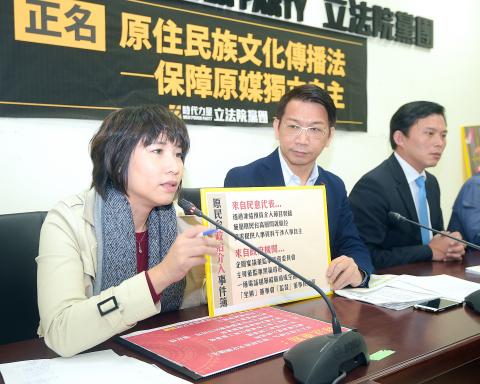The New Power Party (NPP) yesterday proposed a draft amendment to the Act for the Establishment of the Indigenous Peoples Cultural Foundation (財團法人原住民族文化事業基金會設置條例) to ensure that the foundation, which operates Taiwan Indigenous TV, is free from political interference that might affect the objectivity of its programs.
Since the station was launched in 2004, it has been subject to political interference from government agencies and legislators, who have frozen the foundation’s budget to pressure it to present certain perspectives in its programs, NPP Legislator Kawlo Iyun Pacidal, an Amis, told a news conference in Taipei.
Citing her experience as a reporter for the station, she said that she was punished after a report on the Council of Indigenous Peoples was aired.

Photo: Huang Yao-cheng, Taipei Times
“If political interference can be allowed to have a ‘chilling effect’ on news reports, it will surely be detrimental to democracy and the freedom of speech,” she said.
Some legislators have used their influence to help their acquaintances land managerial positions at the station, she said.
The foundation’s former president Bukun Ismahasan Islituan was forced to leave his post overnight late last month after receiving a telephone call from the council, she said, adding that even though the foundation and the station are funded by the council and are using the budget granted by it, such an action defeated the purpose of a media outlet.
The election of the foundation’s directors and supervisors is conducted under an opaque system, and government officials have been seen at lavish banquets with election committee members before elections, she said.
The draft amendment calls for the title of the act to be changed to “indigenous peoples cultural broadcasting act” and removing the statutes that allow the foundation to manage subsidies for work promoting Aboriginal culture, so that the foundation can focus on its work to operate a media outlet that serves the public interest.
It also calls for the establishment of a transparent electoral system for the foundation’s board members and chief executive officer.
The draft amendment seeks to ensure the independence of programs produced by the channel and the accessibility of programs about indigenous cultures, as well as to create a system in which the foundation can be held accountable for the programs it makes.
It also proposes that a fixed percentage of funds be allotted from the council’s budget to finance the foundation, thereby ensuring its financial independence.
Also yesterday, the NPP legislative caucus reasserted its support for a draft bill legalizing same-sex marriage, saying that same-sex union is a value the party would defend.
The statement came two days after opponents of gay marriage said that they have gathered enough signatures to submit a petition to unseat NPP Executive Chairman Huang Kuo-chang (黃國昌), a vocal supporter of same-sex marriage.
Asked if he is in favor of holding a referendum on legalizing gay marriage, as people opposed to the issue have recommended, Huang said he is not, as marriage is a basic human right protected by the Constitution that should not be decided by a referendum.

An essay competition jointly organized by a local writing society and a publisher affiliated with the Chinese Communist Party (CCP) might have contravened the Act Governing Relations Between the People of the Taiwan Area and the Mainland Area (臺灣地區與大陸地區人民關係條例), the Mainland Affairs Council (MAC) said on Thursday. “In this case, the partner organization is clearly an agency under the CCP’s Fujian Provincial Committee,” MAC Deputy Minister and spokesperson Liang Wen-chieh (梁文傑) said at a news briefing in Taipei. “It also involves bringing Taiwanese students to China with all-expenses-paid arrangements to attend award ceremonies and camps,” Liang said. Those two “characteristics” are typically sufficient

A magnitude 5.9 earthquake that struck about 33km off the coast of Hualien City was the "main shock" in a series of quakes in the area, with aftershocks expected over the next three days, the Central Weather Administration (CWA) said yesterday. Prior to the magnitude 5.9 quake shaking most of Taiwan at 6:53pm yesterday, six other earthquakes stronger than a magnitude of 4, starting with a magnitude 5.5 quake at 6:09pm, occurred in the area. CWA Seismological Center Director Wu Chien-fu (吳健富) confirmed that the quakes were all part of the same series and that the magnitude 5.5 temblor was

The brilliant blue waters, thick foliage and bucolic atmosphere on this seemingly idyllic archipelago deep in the Pacific Ocean belie the key role it now plays in a titanic geopolitical struggle. Palau is again on the front line as China, and the US and its allies prepare their forces in an intensifying contest for control over the Asia-Pacific region. The democratic nation of just 17,000 people hosts US-controlled airstrips and soon-to-be-completed radar installations that the US military describes as “critical” to monitoring vast swathes of water and airspace. It is also a key piece of the second island chain, a string of

The Central Weather Administration has issued a heat alert for southeastern Taiwan, warning of temperatures as high as 36°C today, while alerting some coastal areas of strong winds later in the day. Kaohsiung’s Neimen District (內門) and Pingtung County’s Neipu Township (內埔) are under an orange heat alert, which warns of temperatures as high as 36°C for three consecutive days, the CWA said, citing southwest winds. The heat would also extend to Tainan’s Nansi (楠西) and Yujing (玉井) districts, as well as Pingtung’s Gaoshu (高樹), Yanpu (鹽埔) and Majia (瑪家) townships, it said, forecasting highs of up to 36°C in those areas